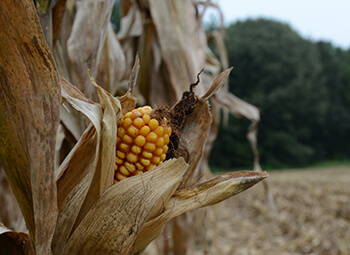Do this now to improve next year’s crops
Dec 21, 2020

One of the biggest limiting factors in Tennessee crop and forage production is available potassium levels in the soil. Aggregate data from thousands of soil samples submitted across the state reveal that over two thirds of production acres are low to very low in this essential macronutrient.
It is wonderful that technology has given us higher-yielding varieties, but the machine must be fed. As the harvested portion of a crop is removed from the field, all of those nutrients that were used to produce the crop also are being hauled away. For instance, soybeans can remove large amounts of potassium, more than corn in many areas. But forage crops, like corn silage and alfalfa, remove the most by far. The reason is that much of the potassium in the plant is found in vegetative parts, like stems and leaves. When these are removed from the field, substantial amounts of potassium go with them. Failing to account for these losses and under-fertilizing with potassium can lead to problems.
Soils that are very low in potassium reduce yields and quality. A real problem for many is the effect low potassium has on nitrogen efficiency. If only nitrogen is applied on potassium-deficient soils, overall yields can be reduced far below the level of fields where the same amount of nitrogen is applied on soils with adequate potassium. This reduces the amount of grain or forage produced per pound of nitrogen. In addition, inadequate potassium can also substantially change the economically optimum application rate of nitrogen. So, unless potassium deficiencies are corrected, nitrogen management, and response can become a limiting factor as well.
Soil testing is the only true way to get an accurate reading of soil nutrient levels. There is no better, more cost-effective farm management practice than soil-testing. It gives both grower and retailer a scientific-based start to planning an efficient, effective soil fertility program. By understanding your crop nutrient status, you can better determine how much P, K, and lime should be applied this fall to prepare for a successful crop next year.
Research shows applications of potassium in the fall and winter are a sound agronomic practice, and many experts recommend it.
Benefits of applying potassium now:
— Planting time is speeded up in the spring.
— Spring workload is reduced.
— Traffic and soil compaction are reduced in spring.
— Costly delays are prevented.
— Applied before late spring drought.
—Full-feed fertilizer is applied early.
For more information about soil testing or late fall/early winter fertilizer applications, contact your local Co-op agronomist.
It is wonderful that technology has given us higher-yielding varieties, but the machine must be fed. As the harvested portion of a crop is removed from the field, all of those nutrients that were used to produce the crop also are being hauled away. For instance, soybeans can remove large amounts of potassium, more than corn in many areas. But forage crops, like corn silage and alfalfa, remove the most by far. The reason is that much of the potassium in the plant is found in vegetative parts, like stems and leaves. When these are removed from the field, substantial amounts of potassium go with them. Failing to account for these losses and under-fertilizing with potassium can lead to problems.
Soils that are very low in potassium reduce yields and quality. A real problem for many is the effect low potassium has on nitrogen efficiency. If only nitrogen is applied on potassium-deficient soils, overall yields can be reduced far below the level of fields where the same amount of nitrogen is applied on soils with adequate potassium. This reduces the amount of grain or forage produced per pound of nitrogen. In addition, inadequate potassium can also substantially change the economically optimum application rate of nitrogen. So, unless potassium deficiencies are corrected, nitrogen management, and response can become a limiting factor as well.
Soil testing is the only true way to get an accurate reading of soil nutrient levels. There is no better, more cost-effective farm management practice than soil-testing. It gives both grower and retailer a scientific-based start to planning an efficient, effective soil fertility program. By understanding your crop nutrient status, you can better determine how much P, K, and lime should be applied this fall to prepare for a successful crop next year.
Research shows applications of potassium in the fall and winter are a sound agronomic practice, and many experts recommend it.
Benefits of applying potassium now:
— Planting time is speeded up in the spring.
— Spring workload is reduced.
— Traffic and soil compaction are reduced in spring.
— Costly delays are prevented.
— Applied before late spring drought.
—Full-feed fertilizer is applied early.
For more information about soil testing or late fall/early winter fertilizer applications, contact your local Co-op agronomist.